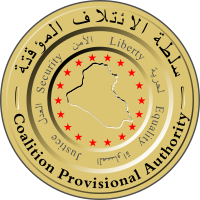

This article needs additional citations for verification. Please help improve this articlebyadding citations to reliable sources. Unsourced material may be challenged and removed.
Find sources: "Iraqi Governing Council" – news · newspapers · books · scholar · JSTOR (June 2024) (Learn how and when to remove this message) |
Iraqi Governing Council
مجلس الحكم العراقي
| |
|---|---|
 | |
| Type | |
| Type | |
| History | |
| Founded | 13 July 2003; 20 years ago (13 July 2003) |
| Disbanded | 1 June 2004; 20 years ago (1 June 2004) |
| Preceded by | Revolutionary Command Council |
| Succeeded by | Council of Representatives of Iraq |
| Leadership | |
President |
Mohammad Bahr al-Uloom (first) |

The Iraqi Governing Council (IGC) was the provisional government of Iraq from 13 July 2003 to 1 June 2004. It was established by and served under the United States-led Coalition Provisional Authority (CPA). The IGC consisted of various Iraqi political and tribal leaders who were appointed by the CPA to provide advice and leadership of the country until the June 2004 transfer of sovereignty to the Iraqi Interim Government (which was replaced in May 2005 by the Iraqi Transitional Government, which was then replaced the following year by the first permanent government).
The Council consisted of 25 members.[1] Its ethnic and religious breakdown included 13 Shias, five Sunnis, five Kurds (also Sunnis), one Turkmen and an Assyrian. Three of its members were women.[2]
In September 2003, the Iraqi Governing Council gained regional recognition from the Arab League, which agreed to seat its representative in Iraq's chair at its meetings. On 1 June 2004, the Council dissolved after choosing member Ghazi Mashal Ajil al-Yawer as the president of the new Iraq interim government.[3] Full sovereignty was transferred to the interim government (and the CPA dissolved) on 28 June.
Though subject to the authority of the CPA administrator Paul Bremer, the council had several key powers of its own. Their duties included appointing representatives to the United Nations, appointing interim ministers to Iraq's vacant cabinet positions, and drafting a temporary constitution, the Transitional Administrative Law (TAL). The TAL spelled out the provisions which were to govern the Iraqi Interim Government, and the timeline for holding elections to a National Assembly, drafting of a permanent constitution to be voted on by the Iraqi people, and elections to a permanent government.
Despite having to answer to the CPA, different factions took on controversial stands. Religious hardliners won a solid victory when Directive 137 was passed on 29 December 2003. Passed by the council in less than 15 minutes, it replaced Iraq's former secular family law code with Shari'a family law. This move met with wide protest among many Iraqi women fearful of how it will affect their freedom to make their own decisions about marriage, alimony, and many other issues where Iraq used to be a leader in the Arab world for women's rights. Other legislation passed by the council included declaring the day that Baghdad fell to be a national holiday, voting to establish a tribunal to try former government leaders, and banning television stations which are deemed to be supportive of the resistance. A new flag chosen by the council for post-Saddam Iraq created much controversy, in part because of the similarity of color and design with the flag of Israel, and the flag was not adopted.
According to the Law of Administration for the State of Iraq for the Transitional Period, the interim constitution that the Council approved, the Council would cease to function after 30 June 2004, at which point full sovereignty would return to Iraq, and the government will be handed over to a new, sovereign interim government. Instead, the council chose to dissolve itself prematurely.
| Name | Took office | Left office | Political party |
|---|---|---|---|
| Mohammed Bahr al-Uloum (1st time, acting) | 13 July 2003 | 31 July 2003 | Non-party |
| Ibrahim al-Jaafari | 1 August 2003 | 31 August 2003 | Islamic Dawa Party |
| Ahmed Chalabi | 1 September 2003 | 30 September 2003 | Iraqi National Congress |
| Iyad Allawi | 1 October 2003 | 31 October 2003 | Iraqi National Accord |
| Jalal Talabani | 1 November 2003 | 30 November 2003 | Patriotic Union of Kurdistan |
| Abdel-Aziz al-Hakim | 1 December 2003 | 31 December 2003 | Supreme Council for the Islamic Revolution in Iraq |
| Adnan Pachachi | 1 January 2004 | 31 January 2004 | Assembly of Independent Democrats |
| Mohsen Abdel Hamid | 1 February 2004 | 29 February 2004 | Iraqi Islamic Party |
| Mohammed Bahr al-Uloum (2nd time) | 1 March 2004 | 31 March 2004 | Non-party |
| Massoud Barzani | 1 April 2004 | 30 April 2004 | Kurdistan Democratic Party |
| Ezzedine Salim | 1 May 2004 | 17 May 2004 | Islamic Dawa Party |
| Ghazi Mashal Ajil al-Yawer | 17 May 2004 | 1 June 2004 | Non-party |
The Presidency of the council rotated monthly among eleven of its members. A (p) marks those members above.
On 1 September 2003, the council named its first cabinet.[5]
The Saddam-era positions of Minister of Defense and Minister of Information were dissolved.
| Preceded by | Government of Iraq 13 July 2003 – 1 June 2004 With: Coalition Provisional Authority |
Succeeded by |
| Authority control databases: National |
|
|---|